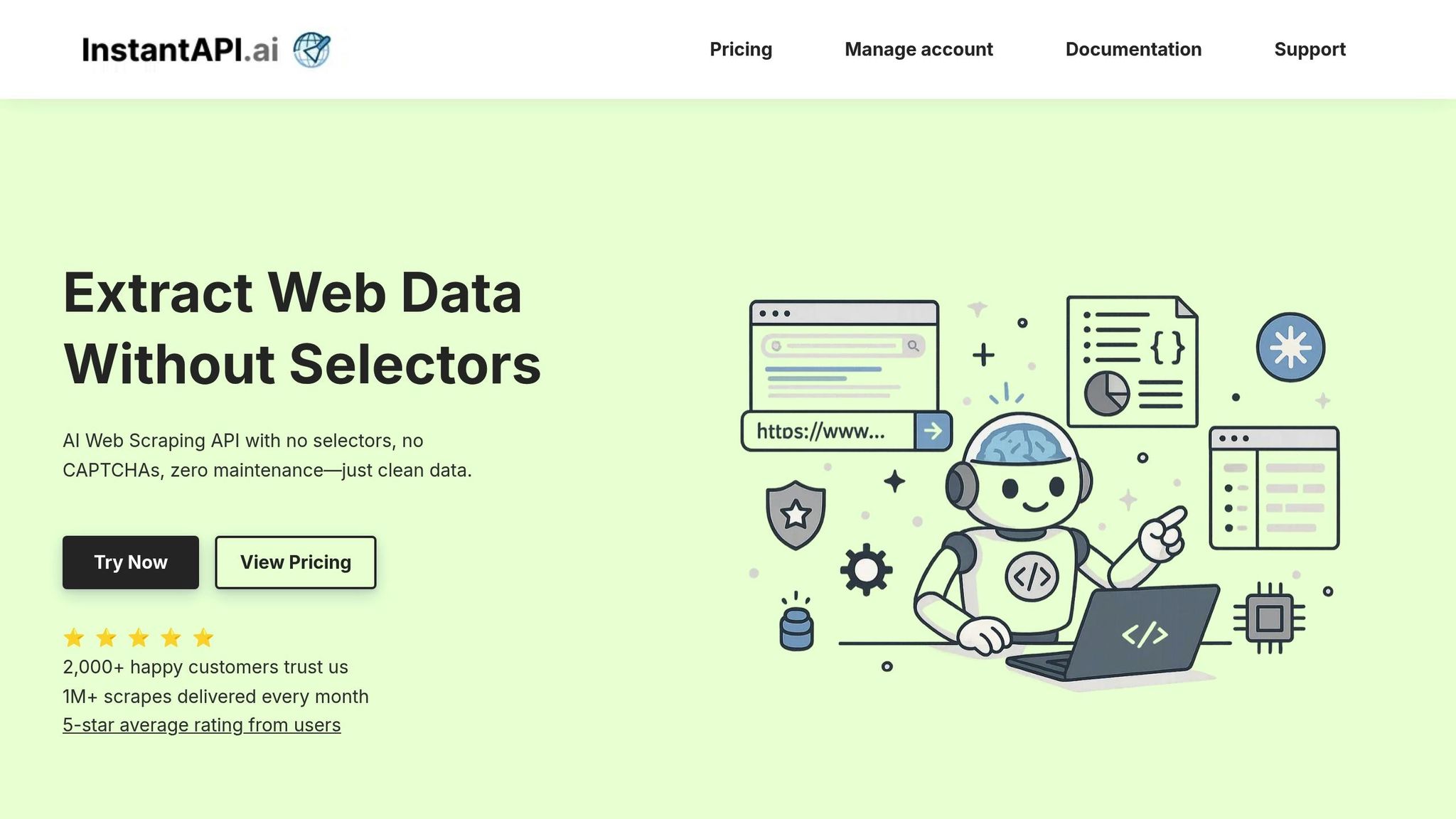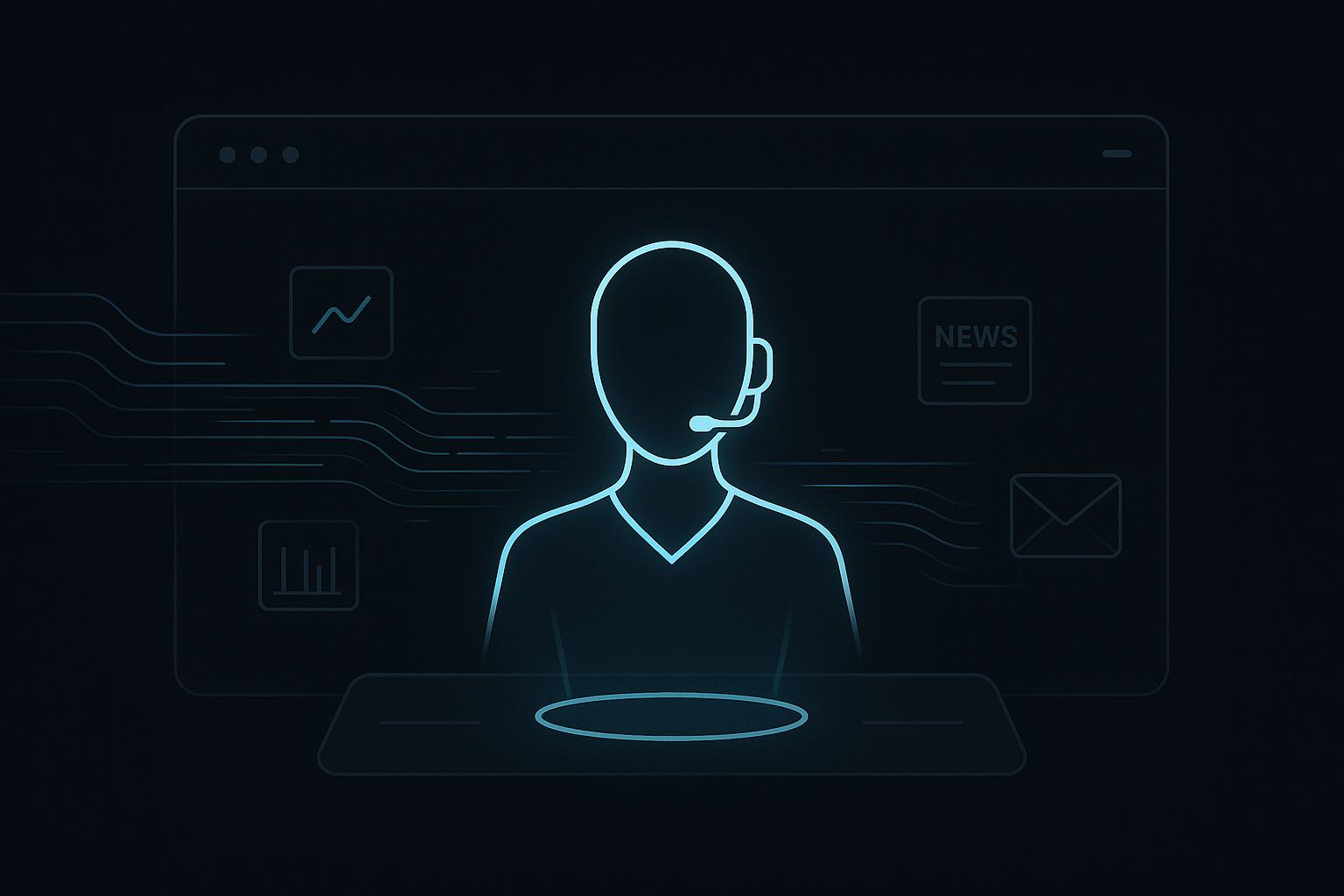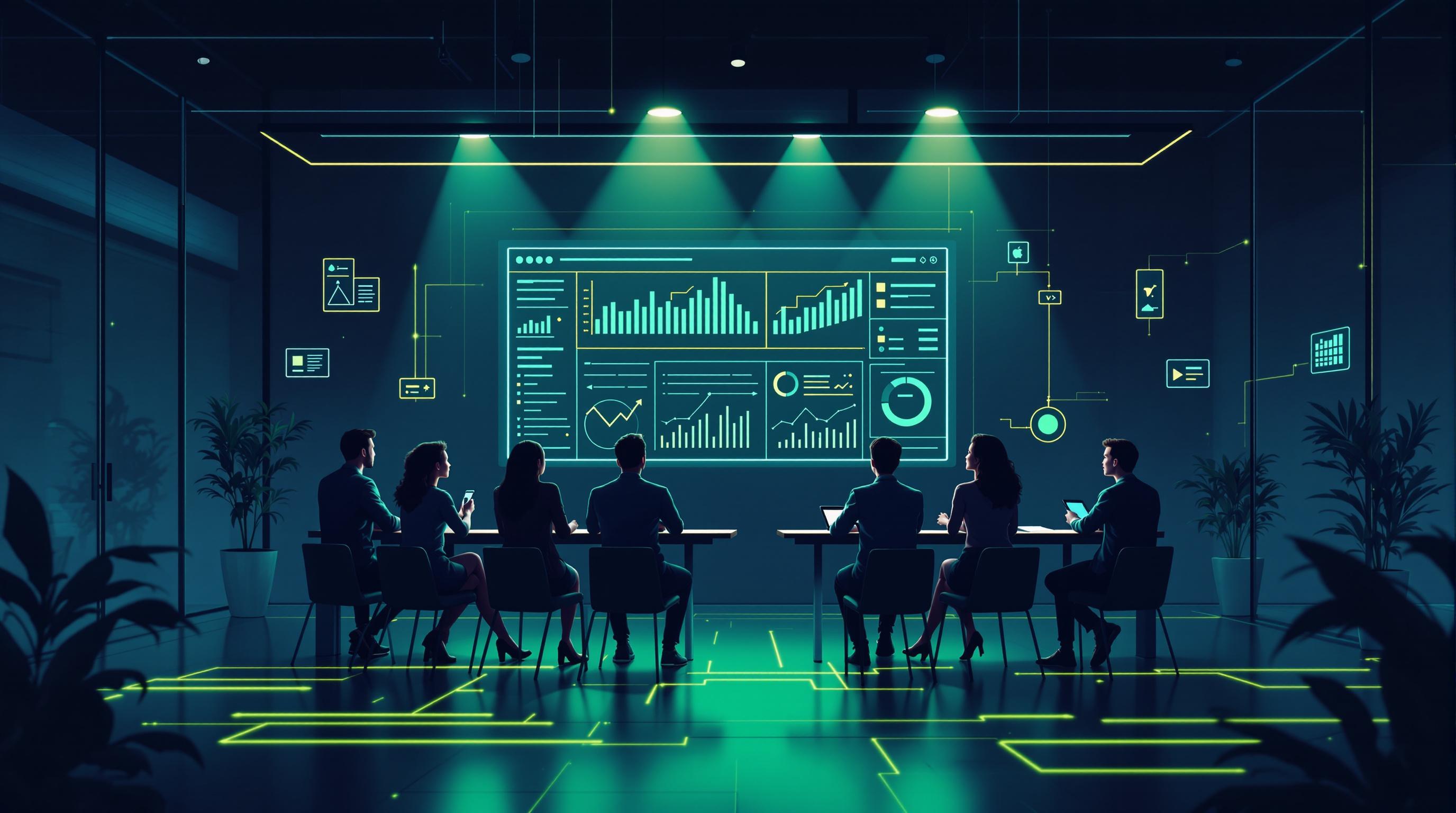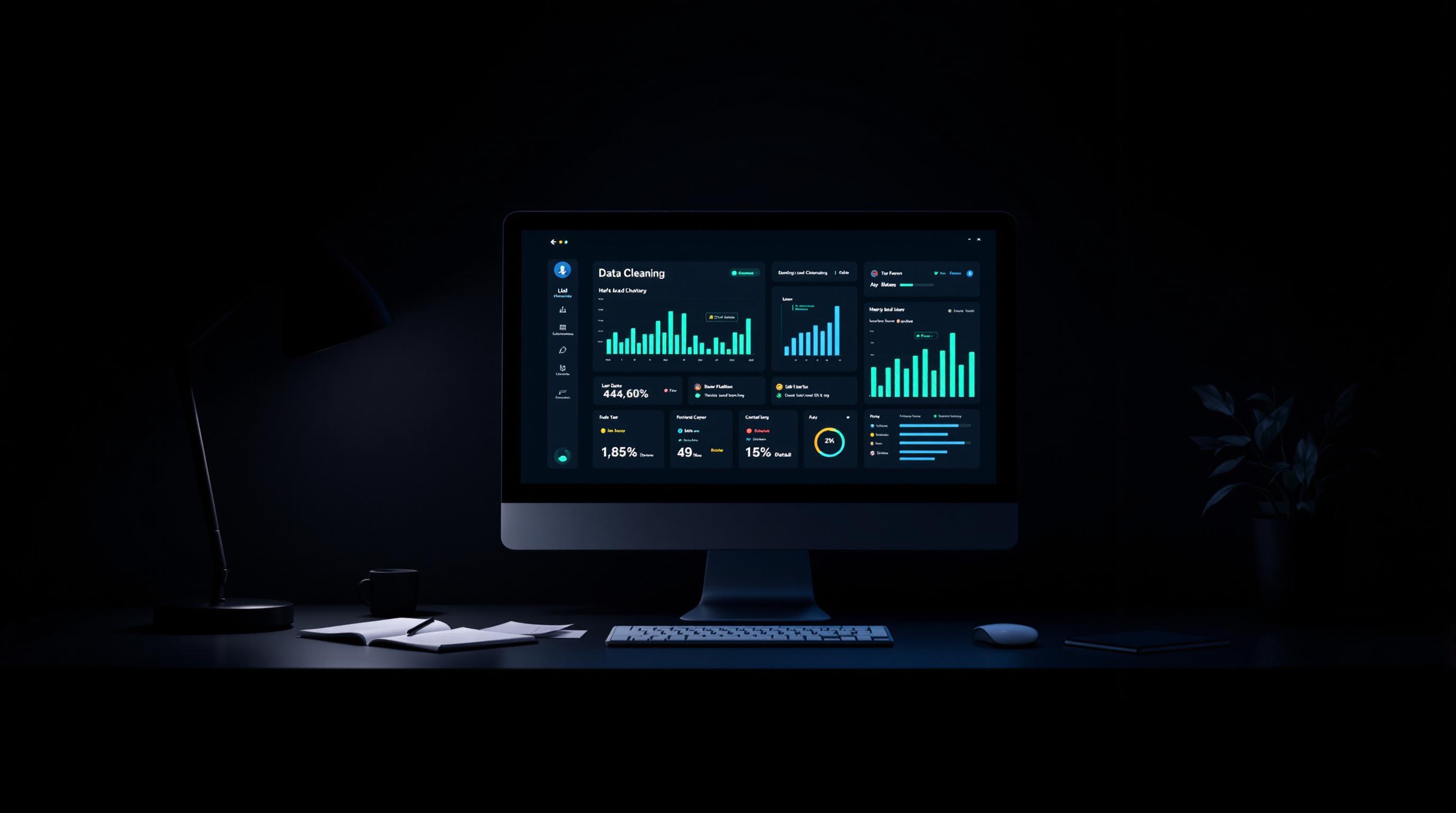Web scraping is transforming the hospitality industry by providing actionable data to improve guest experiences, optimize pricing, and stay competitive. Here's a quick summary of how it works and its benefits:
- What is Web Scraping?: Automated tools collect data like pricing, reviews, and availability from public websites.
- Why It Matters: Hospitality businesses use this data for real-time pricing, guest sentiment analysis, and personalized services.
- Key Benefits:
- Better Guest Experiences: Analyze reviews to address issues and improve services.
- Dynamic Pricing: Track competitors to adjust rates and maximize revenue.
- Personalization: Use guest preferences to tailor services and marketing.
- Tools and Techniques: From Python libraries like Scrapy to managed APIs like InstantAPI.ai, businesses can choose solutions based on their needs.
- Ethical Practices: Follow legal guidelines (like respecting robots.txt and privacy laws) to ensure responsible data collection.
Quick Overview
Web scraping helps hotels and travel companies collect and analyze data to make smarter decisions, improve guest satisfaction, and boost revenue - all while navigating legal and ethical boundaries. Whether you're a large hotel chain or a small boutique property, tools like InstantAPI.ai make it easier to gather and use data effectively.
Cracking the Code of Hotel Reviews: scraping TripAdvisor data without coding
How Hospitality Businesses Use Web Scraping
Web scraping takes raw data and turns it into insights that can improve guest satisfaction and boost business performance. Hotels, restaurants, and travel companies rely on these techniques daily to stay competitive and refine their services. Let’s dive into how guest reviews, competitor tracking, and personalized guest data are shaping the hospitality industry.
Collecting and Analyzing Guest Reviews
Guest reviews are the backbone of reputation management in hospitality, and web scraping allows businesses to gather reviews from major platforms all at once. This means hotels can analyze thousands of reviews from sites like TripAdvisor, Booking.com, Google Reviews, and Yelp to uncover actionable trends.
Take this example: A hotel chain used automated tools to collect reviews from Booking.com. The analysis revealed a recurring issue with room cleanliness across multiple locations. As a result, the chain retrained its housekeeping staff and introduced stricter cleaning protocols. On the flip side, reviews consistently praised the complimentary breakfast, prompting the hotel to expand the menu and highlight this perk more in its marketing efforts.
Sentiment analysis takes this a step further by examining the tone of guest feedback. Hotels can categorize reviews as positive, negative, or neutral and identify common themes - whether it’s the check-in process, dining quality, or staff interactions.
"AI can use occupancy data, guest feedback, and self-reported guest data to gauge which upgrades, or repairs should be implemented first and which improvements will deliver the best return." - Seth Redmore, CMO, Lexalytics
Scraping also helps with competitive benchmarking. By analyzing competitor reviews, hotels can pinpoint where others are excelling and where they’re falling short. This allows them to adjust their own services accordingly. Considering it costs 5–8 times more to attract a new customer than to retain an existing one, this real-time data is crucial for addressing issues before negative feedback gains traction.
Tracking Competitor Prices and Room Availability
Beyond guest reviews, hotels use web scraping to monitor competitor pricing and availability, which is key for dynamic pricing strategies. By tracking competitor websites and online travel agencies, hotels can stay updated on price changes, promotions, and availability patterns.
For instance, scraped data often reveals booking trends tied to major events, enabling hotels to adjust their pricing to maximize revenue. Hotels can also analyze which amenities are offered by higher-priced competitors, helping them decide where to invest.
One hotel chain worked with a data scraping service to track competitor pricing and availability. Using this information, they implemented dynamic pricing strategies that led to a 15% increase in revenue and higher occupancy rates. Additionally, the scraped data fed into machine learning models, helping the chain predict demand shifts and optimize room rates for seasonal trends, event-driven spikes, and competitor promotions.
Creating Personalized Services with Guest Data
Web scraping also enables hospitality businesses to gather detailed guest preference data, going beyond what’s available through direct bookings. By analyzing preferences across platforms, hotels can create comprehensive guest profiles and deliver more tailored services.
This might include tracking reviews to identify preferences for room types, amenities, dining options, or local activities. Armed with this information, hotels can customize recommendations and services to better meet guest needs. For example, a travel aggregator used real-time scraped feedback from various booking platforms and saw a 25% boost in user engagement and bookings. Travelers appreciated the tailored recommendations, which improved their overall experience.
Personalization doesn’t stop there. Hotels also use scraped data to refine their marketing strategies. They identify the best-performing keywords for search engine optimization, monitor competitor reviews to spot service gaps, and address potential issues before they escalate. This proactive approach enhances loyalty programs by tailoring benefits and communication based on guest sentiment, ensuring a better overall connection with their audience.
Web Scraping Tools and Setup Methods
Web scraping in the hospitality industry spans a wide range of solutions, from programming libraries to fully managed API services. Let’s take a closer look at some of the key technologies and how they meet the unique challenges of hospitality data collection.
Common Web Scraping Technologies
Python-based tools like BeautifulSoup and Scrapy are go-to options for technical teams. BeautifulSoup is great for parsing HTML, while Scrapy offers a full framework for handling large-scale scraping projects. However, these tools often require heavy development effort and ongoing maintenance. As websites update their layouts or implement anti-bot measures, scraping scripts can break, making upkeep a constant battle. Additionally, the use of headless browsers can put significant strain on server resources.
Many hospitality businesses that start with custom-built solutions quickly encounter these hurdles. Frequent website changes, anti-bot defenses, and the resource demands of sophisticated scraping can make these setups more trouble than they’re worth.
No-code scraping tools provide a more user-friendly interface, but they struggle with the complex, dynamic websites often found in the hospitality sector. Booking platforms, for example, rely on features like infinite scrolling, dynamic pricing, and advanced bot detection, all of which can render no-code tools ineffective. When problems occur, users often need technical expertise to troubleshoot and debug, defeating the purpose of a "no-code" solution.
Managed API services simplify the process by handling the technical heavy lifting for you. These services take care of proxy rotation, CAPTCHA solving, and JavaScript rendering, allowing teams to focus on analyzing the data rather than maintaining the tools.
How InstantAPI.ai Works for Hospitality Data

InstantAPI.ai offers a streamlined approach to web scraping by eliminating the need for manual selector creation. Instead, it uses a JSON-based description to extract data, bypassing the complexities of writing CSS selectors or XPath expressions.
Its pricing model is especially appealing for hospitality businesses with fluctuating needs. At $2 per 1,000 pages scraped, it offers a pay-as-you-go option that’s far more flexible than traditional services requiring monthly commitments. This structure is ideal for seasonal businesses that need heavy data collection during peak periods but scale back during slower times.
"After trying several other solutions, we were won over by the simplicity of InstantAPI.ai's Web Scraping API. It's fast, straightforward, and lets us focus on what matters most - our core features." - Juan, Scalista GmbH
The service also includes built-in anti-bot measures, proxy rotation, and JavaScript rendering, all without requiring additional setup. This makes it easier for hospitality teams to scrape data from complex booking platforms and review sites without running into technical roadblocks.
InstantAPI.ai offers four key endpoints tailored to hospitality needs:
/scrape: Extracts structured data./links: Identifies property listings./next: Automates pagination./search: Retrieves location-aware Google results.
Connecting Scraped Data to Your Systems
Once you’ve scraped the data, the next step is integrating it into your existing systems. This integration is crucial for enabling real-time adjustments and improving decision-making.
Real-time API integration is perfect for applications that need live updates. For example, revenue management systems can use scraping APIs to refresh competitor pricing data hourly, allowing hotels to adjust their rates dynamically. Similarly, customer service platforms can pull the latest review data to address potential issues before they escalate.
Batch processing workflows are better suited for periodic analysis. Tools like Apache Airflow, Dagster, or even cron jobs can schedule scraping tasks and load the results into data warehouses. This setup works well for generating weekly market reports or monthly trend analyses.
Business intelligence dashboards like Tableau, Power BI, or Looker can bring scraped data to life by visualizing it alongside internal metrics. For instance, hotels can create dashboards that compare their average daily rates to competitors, track guest satisfaction scores, or analyze booking trends across different channels.
To ensure smooth integration, it’s critical to clean and standardize the data before using it. This might involve tasks like converting currencies, unifying date formats, or categorizing review sentiments consistently. Many hospitality businesses start with simple integrations and gradually expand to more advanced data pipelines as their needs evolve. With API-based scraping services, this incremental approach is both manageable and scalable.
sbb-itb-f2fbbd7
Legal and Ethical Web Scraping Practices
For hospitality businesses, navigating the legal aspects of web scraping is crucial. Understanding these rules not only ensures compliance but also guides ethical data collection practices. In the United States, there isn’t a single, all-encompassing law for web scraping. Instead, several legal frameworks apply based on the type of data collected and the methods used.
US Laws That Apply to Web Scraping
Here are some key legal points to consider:
- Computer Fraud and Abuse Act (CFAA): This law penalizes unauthorized access to protected computers. In the hiQ Labs, Inc. v. LinkedIn Corp. case, the Ninth Circuit ruled that scraping publicly available data doesn’t violate the CFAA, as the act applies when access controls like passwords are bypassed.
- Copyright Law and the Digital Millennium Copyright Act (DMCA): The DMCA prohibits bypassing technological measures that protect copyrighted works. While raw data, such as room rates or availability, typically isn’t copyrightable, the way data is organized or presented might be.
- Privacy Regulations: Laws like the California Consumer Privacy Act (CCPA) govern how personal data is handled. Even if the information is publicly available, businesses must ensure compliance when collecting or using data that could be considered personal.
- Website Terms of Service: Many websites explicitly forbid automated data collection in their terms of service. Violating these terms could result in breach of contract claims, even if federal laws aren’t broken.
Guidelines for Responsible Web Scraping
Ethical web scraping is about balancing your business needs with respect for the websites you collect data from. Here are some best practices:
- Follow robots.txt files: These files outline which parts of a website are off-limits to automated tools. Respecting them is a key step toward ethical scraping.
- Space out requests: Avoid overwhelming servers by maintaining reasonable intervals between requests - typically at least one second apart.
- Use official APIs when available: APIs often provide a more stable and approved way to access data, with clear usage guidelines.
- Be transparent: Use descriptive user agent strings to identify your organization and the purpose of your requests. This openness can foster trust with website owners.
- Only collect necessary data: Focus on publicly available information that directly supports your goals, such as competitor pricing, amenities, or aggregate review trends. Avoid collecting unnecessary personal data.
How Hospitality Companies Stay Compliant
Maintaining compliance requires proactive policies and regular reviews. Here’s how businesses can stay on track:
- Review legal policies and monitor changes: The legal landscape for web scraping evolves frequently. Work with legal counsel to regularly assess your practices and adapt to changes in website terms or anti-scraping measures.
- Securely store data and manage access: If personal data is collected, ensure it’s stored securely, with access limited to authorized personnel. Define clear retention policies to align with privacy laws.
- Vet third-party vendors: If you use third-party scraping services, confirm that they follow ethical and legal standards. Request documentation of their compliance processes to ensure they meet your requirements.
Balancing data collection needs with respect for the sources ensures compliance and helps create a healthier digital environment. By adhering to these practices, hospitality businesses can confidently leverage data collection to enhance guest experiences while staying within legal and ethical boundaries.
Future of Data Collection in Hospitality
The hospitality industry is undergoing a major shift, driven by advancements in artificial intelligence and web scraping technology. Hotels and travel companies are finding new ways to understand their guests and improve operations, with the promise of more tailored experiences and smarter decision-making powered by real-time data.
AI-Powered Guest Personalization and Predictions
Artificial intelligence is reshaping how hospitality businesses use web-scraped data to create highly personalized guest experiences. Instead of offering one-size-fits-all services, AI analyzes customer preferences, social media activity, and past behaviors to deliver experiences tailored to individual needs.
The impact is clear. Hotels using real-time guest analytics have seen satisfaction scores rise by 18-24%, guest loyalty improve by up to 30%, and average daily rates increase by 23%, along with a 34% boost in ancillary spending per guest.
Leading brands are at the forefront of this transformation. Hilton, for example, uses its AI-powered chatbot, "Connie", to provide personalized travel advice, restaurant bookings, and event suggestions based on real-time data and individual preferences. Similarly, Expedia combines AI with web scraping to gather insights on travel trends, competitor pricing, and customer reviews. This data enables them to offer personalized recommendations, optimize pricing, and enhance customer satisfaction.
The Otonomus Hotel, the first fully AI-driven hotel, takes personalization to the next level by adapting to each guest's preferences, behaviors, and habits. Meanwhile, startups like Speakspots.com are introducing AI-powered tools, such as reservation agents that can handle guest communications, book activities, and overcome language barriers.
"We're giving hoteliers the tools they need to seamlessly deliver a 5-star guest experience both in and around the hotel, all while increasing their revenue per guest and championing local businesses and SMEs." - Andres Martinez Artal, CEO and founder of Speakspots.com
These advancements allow businesses to integrate guest insights into real-time decision-making, making operations more agile and responsive.
Real-Time Data for Quick Business Decisions
Real-time data is revolutionizing how hotels respond to market changes. In an industry where timing is everything, real-time web scraping enables dynamic pricing, demand forecasting, and instant service adjustments. This agility is crucial, with 73% of hotel executives rating real-time analytics as "extremely important" to their strategy.
AI-powered data systems now allow for predictive and prescriptive analytics, helping businesses anticipate trends and recommend actions. This shift from reactive to proactive decision-making is transforming hotel operations. According to Gartner, by 2025, 75% of organizations will operationalize AI, a significant jump from 15% in 2022.
The growth of the hospitality market highlights the importance of these tools. In 2024, the industry reached $4.9 trillion, with a GDP impact of $11.1 trillion (10% of global GDP). Global tourism saw 1.1 billion travelers from January to September 2024, an 11% increase from 2023. Between 2022 and 2032, travel and tourism are projected to grow at 5.8% annually, outpacing global economic growth.
AI-driven pricing models and machine learning algorithms allow hotels to adjust rates and operations in real time, ensuring profitability during peak seasons while staying competitive during slower periods. These systems analyze historical data and external factors to optimize staffing, inventory, and pricing strategies automatically.
67% of travel firms using real-time travel data extraction report faster decision-making and better responsiveness to market changes. By automating the analysis of market shifts, machine learning eliminates delays, enabling hospitality leaders to act instantly.
"Information is the oil of the 21st century, and analytics is the combustion engine." - Peter Sondergaard, senior vice president and global head of Research at Gartner, Inc.
The integration of self-managing scraping tools takes this efficiency even further.
Benefits of Self-Managing Web Scraping Tools
Self-managing web scraping tools are addressing long-standing challenges in hospitality data collection. These tools automatically adapt to website changes, reducing the technical burden on businesses and allowing teams to focus on actionable insights instead of maintenance.
72% of companies using hotel data scraping tools report improved pricing accuracy and competitive benchmarking. The global web scraper software market is expected to reach $2.49 billion by 2032, reflecting the growing demand for automated solutions.
With self-managing scraping tools, hospitality businesses gain control over pricing, revenue, and market positioning. These tools provide immediate insights into competitor pricing, demand-driven rate changes, and potential underpricing errors. Real-time data enables hotels to predict trends rather than merely react to them.
Modern solutions like InstantAPI.ai streamline the process by automating tasks like proxy rotation, CAPTCHA solving, and JavaScript rendering. Businesses can simply point an API at any public URL and receive clean, structured JSON data without worrying about technical complexities.
AI integration further enhances these tools by ensuring data quality. AI-powered bots adapt to website changes, mimic human browsing behavior, and solve CAPTCHAs to avoid detection. This automation allows businesses to monitor reviews in real time, gaining valuable insights into guest expectations without the hassle of manual upkeep.
Flexible, pay-as-you-go pricing models make these tools especially appealing for businesses with fluctuating data needs, enabling them to scale up or down as required without committing to costly contracts. This adaptability ensures that even smaller hospitality operations can leverage the power of real-time data collection.
Conclusion
Web scraping is changing the game for the hospitality industry, turning guesswork into actionable insights that enhance guest experiences and drive revenue. It’s not just about gathering data - it’s about using that data to improve satisfaction, refine pricing strategies, and deliver personalized services.
Key Benefits of Web Scraping in Hospitality
To recap, web scraping offers hospitality businesses three standout advantages:
- Improved guest satisfaction: By analyzing reviews across platforms, businesses can spot service gaps and address concerns before they escalate.
- Smarter pricing strategies: Real-time monitoring of competitor pricing and promotions allows for dynamic adjustments - maximizing revenue during busy times and staying competitive during slower periods.
- Personalized guest experiences: Combining guest preferences with market trends helps create tailored services that boost loyalty and encourage additional spending.
With the global web scraping market expected to hit $5 billion by 2025, the hospitality industry is leading the charge, recognizing the value of data-driven decision-making in a customer-focused environment.
How InstantAPI.ai Simplifies Web Scraping for Hospitality
Traditional web scraping methods often burden hospitality teams with technical headaches. Custom-built Python scripts demand constant updates, point-and-click tools falter with dynamic changes, and standalone proxy services leave teams scrambling to manage extraction logic.
InstantAPI.ai removes these obstacles. Its no-selector extraction method adapts automatically to website changes, delivering clean JSON data without the hassle of CSS selectors or frequent reconfigurations. Hospitality teams can focus on strategy, not technical upkeep. Whether it’s competitor pricing or guest reviews, the API handles access restrictions and ensures compliance with data protection policies.
The flexible pricing model is another win, allowing hotels - whether part of a large chain or a boutique property - to scale data collection based on seasonal needs without being locked into rigid monthly fees.
"Ethical scraping is as much about restraint as it is about reach." - Vinod Chugani, Data Science Professional
What used to take weeks can now be accomplished in hours. With InstantAPI.ai, hospitality businesses can respond quickly to market changes and guest feedback, keeping them ahead in an industry where data-driven agility is key to staying competitive.
FAQs
What steps can hospitality businesses take to use web scraping ethically and legally?
Hospitality businesses can use web scraping responsibly by sticking to a few essential practices. To start, they should only gather data that's publicly accessible and ensure they follow a website's terms of service to avoid breaching any agreements. Steering clear of deceptive tactics, like cloaking or faking identity through user agents, is equally critical.
On top of that, safeguarding data is a must. This means using encryption and secure storage methods to protect any collected information. Creating clear internal guidelines for how data is collected and used can also help ensure transparency and compliance with privacy laws. By following these steps, hospitality businesses can make the most of web scraping while avoiding potential legal and ethical pitfalls.
What are the benefits of using managed API services like InstantAPI.ai for web scraping in the hospitality industry?
Managed API services, such as InstantAPI.ai, have become a game-changer for the hospitality industry by automating web scraping tasks. These tools save businesses a significant amount of time, minimize errors, and provide access to real-time data. Whether it's tracking guest reviews, monitoring competitor pricing, or staying on top of market trends, these APIs empower businesses to make smarter, data-driven decisions.
Another major advantage is their ability to handle large datasets with ease. This enables hospitality companies to analyze data more effectively, leading to personalized guest experiences and sharper marketing strategies. Plus, by tackling complex issues like CAPTCHA bypassing and seamless data extraction, managed APIs remove the hassle of constant upkeep. The result? A more dependable and efficient way to gather and use crucial data.
How can web scraping help hotels improve guest experiences and optimize pricing strategies?
Web scraping plays a crucial role in helping hotels refine their services by analyzing online reviews and feedback. By diving into this data, hotels can uncover what guests value most - whether it’s specific amenities, service quality, or communication styles. This knowledge empowers hotels to fine-tune their offerings, creating experiences that resonate with guests and foster long-term loyalty.
When it comes to pricing, web scraping provides real-time insights into competitor rates, market trends, and shifts in demand. With this information, hotels can implement dynamic pricing strategies, allowing them to adjust room rates quickly to remain competitive while optimizing revenue and occupancy. These data-driven decisions make it possible for hotels to balance guest expectations with business goals, offering tailored experiences that align with market conditions.


